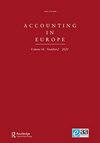Reconciling Competing Reporting Objectives Through Deferred Tax Accounts: Evidence on Private Italian Firms
IF 4.3
Q1 BUSINESS, FINANCE
引用次数: 1
Abstract
Abstract This paper contributes to the growing literature on earnings management in private firms by focusing on deferred taxes. This accounting treatment requires sophisticated use of accruals that provides the chance to manage earnings and net assets without affecting the tax payable. We argue that in a setting with high book-tax conformity, the small room that allegedly exists to recognise deferred taxes remains a comfortable avenue to reach reporting objectives that a tax-minimisation strategy may preclude. We use a sample of private firms operating in a credit- and tax-driven environment such as Italy to test this expectation. Our results show that private firms use deferred taxes to extract multiple financial reporting benefits that may facilitate debt contracting: smoothing earnings over time, meeting/beating historical earnings, avoiding reporting accounting losses, and managing leverage. Tax loss carryforwards are the source of deferred tax assets where the exercise of discretion becomes more critical.通过递延所得税账户协调竞争性报告目标:意大利私人公司的证据
本文章由计算机程序翻译,如有差异,请以英文原文为准。
求助全文
约1分钟内获得全文
求助全文

 求助内容:
求助内容: 应助结果提醒方式:
应助结果提醒方式:


